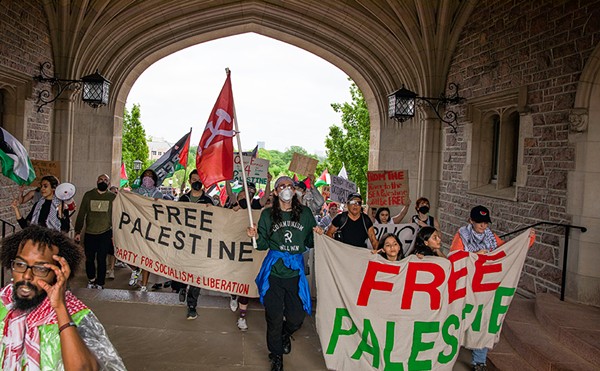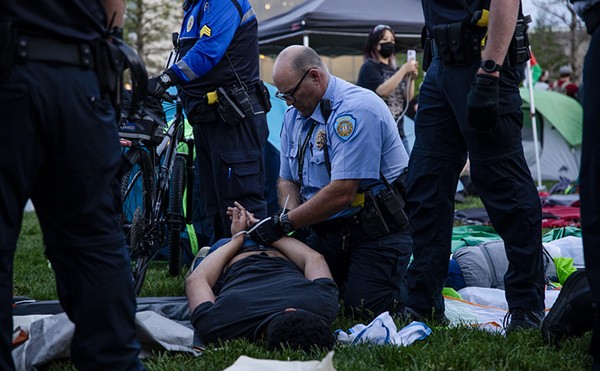
Jennifer Silverberg
St. Louis Language Immersion Schools founder Rhonda Broussard thought the old Hodgen building would be a perfect setting for a charter school.
There was only one problem. The Special Administrative Board (SAB) of the St. Louis Public Schools was set on selling the building for $1 million -- but not to charter-school operators. Sale terms adopted by the SAB in December 2007 prohibit buyers of shuttered public schools from using them for "a primary, elementary or secondary school of any kind providing instruction for any grades kindergarten through twelfth" -- for 100 years.
Charter-school advocates say that so-called deed restriction -- which also bars medical clinics, adult entertainment venues and taverns from taking over city school properties -- far exceeds efforts by other cities to block charter schools' growth.
"Geez, that is the most extreme statement yet that I've seen," exclaims Todd Ziebarth, of the Washington D.C.-based National Alliance for Public Charter Schools. "Most districts will just silently ignore charters and stonewall them and resist efforts, and basically let buildings crumble before giving access to them.
"I have yet to hear of a school district that has put in writing that their buildings can't be used for liquor stores, porn shops -- and charter schools."
Since the 1970s, the exodus of city students to suburban and public charter schools has forced the city district to close dozens of its buildings. Though many of the schools went unsold and unused, charter schools had virtually no success in taking over the idle properties.
During the last major overhaul, in 2003, when former schools superintendent William Roberti put sixteen buildings on the block, most sold to residential developers. One charter school did submit a bid, recalls Vincent Schoemehl, then a school board member. But the board refused to entertain the proposal. Says Schoemehl: "It did not even make it out of the real estate committee."
Since then, public charter schools have opened nonetheless -- in former warehouses, old office buildings, even an erstwhile bank. One program, the Imagine Academy of Careers Middle School, managed to get into the old King Triad School on North Kingshighway Boulevard, when developer Sam Glasser bought and flipped it to Imagine's real estate holding company.
City schools spokesman Patrick Wallace says it was that transaction that prompted the SAB to adopt the deed restriction. "It's a common practice in the corporate world," he explains. "Charter schools are in competition with St. Louis Public Schools. They take funds out of our system, which affects how we can educate the students we have left."
Still, the rationale has many people wondering. "Number one, these guys are in debt up to their eyeballs and are refusing to sell property that people want to buy," says Ross Woolsey, a Clayton financier who heads a group planning to spend $1.75 million in private capital to open an elementary school in the city.
"Number two," continues Woolsey, "they are charged with educating the kids in St. Louis, and if they can't do it, it seems crazy that they would deny someone else the opportunity."
Enrollment in the cash-strapped city school district has plummeted to roughly 26,000 from its peak of 100,000 in the 1960s. The district now has 22 empty school buildings, seven of which are for sale. A consulting firm recently recommended the district shut down as many as 29 additional schools.
Meanwhile, twelve of the fifteen charter schools planning to open by 2011 are looking for real estate.
Says Ziebarth, of the National Alliance for Public Charter Schools: "Finding and financing a property is one of the biggest, if not the biggest, challenge for charter-school operators."
Ziebarth points to California, where the Los Angeles Unified School District refused to make buildings available for charter schools despite a ballot initiative that forced traditional public schools to share space with charters. A similar controversy recently flared up in Washington, D.C.
In Missouri, only St. Louis and Kansas City are permitted to have charter schools, according to state law. Aaron North, executive director of the Kansas City-based Missouri Charter Public School Association, suspects the Kansas City School District may have an "unofficial" policy against selling to charter schools.
"They have approached the district in different ways, including by going through the bid process, and have been unsuccessful," says North. "If they don't want to sell, they could lease for reasonable rates. We're not asking them to give us buildings. We're just asking them to do business."
Bob Herman, a St. Louis attorney specializing in constitutional law, says the city school district has not flouted the law. "I don't see a constitutional problem with it," he says. "I see reasons they shouldn't do it, in that it's very shortsighted. They'll create a white elephant, because what else are you going to use a school for?"
Wallace, the district's spokesman, says it's too soon to rule out the possibility that old buildings might someday house the district's own sponsored charter schools -- it's done in New Orleans, where the new superintendent Dr. Kelvin Adams last worked. "If we do have the opportunity to turn some buildings into our own charters, it wouldn't make sense to sell a bunch of them now," says Wallace.
Still, opponents hope the SAB has a change of heart, especially if the Missouri State Senate approves a resolution urging a reversal of the policy, which state senators Jim Lembke and Jeff Smith introduced last week. "I suspect that if they do not willingly change the policy, that there may be some legislation to require that it be done," says Franc Flotron, a charter schools lobbyist.
Broussard, founder of the Language Immersion Schools, says she will open this fall -- no matter what -- and likely in a Forest Park Southeast commercial rehab. "The mantra is: Our school is not our building. Repeat that. Inhale. Exhale. But all things being equal, we'd rather our school be nestled in a neighborhood."





